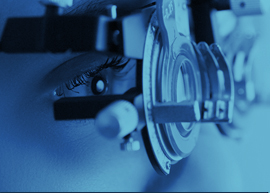 Cataract surgery, which replaces the cataract-affected lens of the eye with a new, clear artificial lens, is the most common surgical procedure in the world. While the procedure is considered safe and effective, patients want to know the optimal time to have the surgery.
Cataract surgery, which replaces the cataract-affected lens of the eye with a new, clear artificial lens, is the most common surgical procedure in the world. While the procedure is considered safe and effective, patients want to know the optimal time to have the surgery.
Early Signs of Cataracts
During the earlier stages, individuals with cataracts experience cloudy vision and sensitivity to glare and light. Halos may appear around lit objects at night, and night vision may be impaired. Colors may appear washed out, such as bright red hues appearing dark pink.
Signs You Need Cataract Surgery
It's common for people to live with cataracts for several years before considering surgery. The following are signs it is time to have your cataracts removed:
- You find it difficult to see well enough to perform tasks at work
- Your vision has gotten in the way of doing activities around the home, such as cooking and cleaning
- You no longer see the television screen or printed material clearly
- Driving, especially at night, no longer feels safe
- Glare and bright lights are more pronounced
If you experience any of the above, schedule an appointment with your eye doctor to discuss cataract surgery.
The Presence of Other Eye Problems
Your eye doctor may encourage you to have cataract surgery if your cataracts render it difficult to examine the back of your eye to treat a range of serious eye conditions, such as glaucoma, macular degeneration and retinopathy. Any of these may require the urgent removal of the cataract so the optometrist can accurately diagnose and manage other serious eye problems.
What Happens If You Delay Surgery?
There are advantages to having cataract surgery earlier rather than later. Cataracts can severely interfere with daily life and can make night driving difficult, even hazardous. If left untreated, cataracts result in vision loss and eventually blindness. Additionally, over time cataracts become thicker, darker and denser, which can add unnecessary complications to the surgery and lengthen the post-surgery recovery period.
However, in certain cases, patients can wait to have cataract surgery. In the meantime, their eye doctor can recommend stronger prescription lenses or the use of bright lights to help them see better.
Whether you decide to get cataract surgery early on or to wait it out, we encourage you to do so under the guidance of Dr. Micheline Young at Cove Eyecare.
Our practice serves patients from Copperas Cove & Killeen, Texas and surrounding communities.
Q: What Are the Benefits of Cataract Surgery?
A: Having cataract surgery:
- - Restores clear vision
- - Enhances enjoyment of reading and watching TV
- - Improves quality of life by allowing you to do everyday activities and hobbies
- - Lowers the risk of developing other eye problems, such as eye inflammation and glaucoma
- - Renders it safer to drive in low light environments
Q: How Do I Lower My Risk of Cataracts?
A: The tips below may help reduce the risk of developing cataracts:
- - Have regular eye exams to catch any problems early
- - Wear sunglasses to block UV rays – 10% of cataract cases are related to the sun’s harmful UV rays
- - Maintain healthy blood sugar levels, particularly if you have diabetes
- - Eat colorful fruits and vegetables rich in Vitamins C and E
- - Quit smoking and drink only moderate amounts of alcohol
- - Be aware that steroidal eye drops and corticosteroids may increase the risk of cataracts
References
- Cataract surgery - Mayo Clinic
- When Are Cataracts Bad Enough To Require Surgery? (allaboutvision.com)
- Cataracts: At what stage should cataracts be removed? (allaboutvision.com)




